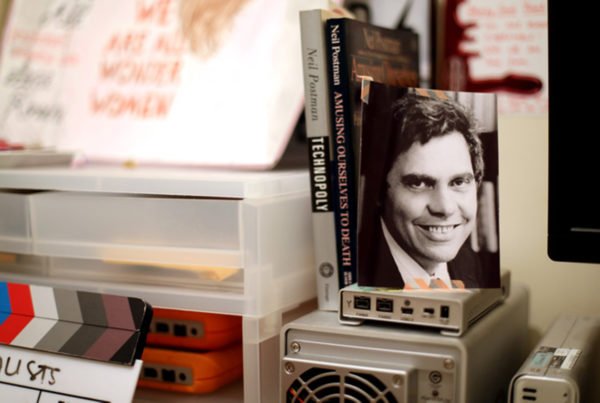In his bestselling book “Digital Minimalism” author Cal Newport advocates for a month-long digital detox. I just did it. Completely unintentionally.
I read Newport’s book back in October. At the time, his advice seemed really appealing but hard to put into action. Too unattainable and incompatible with my job and lifestyle. That is, until recently, when I had to move to a new apartment. This move has forced me to be on a low-tech diet for the past month. It feels as if I’ve been in a time machine, going back to the 1990s. I even went above and beyond the advice of Newport, spending most of my days away from my computer and digital devices. Spoiler alert: I loved this unintentional month of digital minimalism / low tech diet.
You might be reading this and thinking to yourself “Why should I care? I’m not moving anywhere, anytime soon.” Well, if you’ve been yearning to be more intentional with the time you spend online, on your computer or your smartphone, carry on reading. Because later on I will share with you a simple exercise that anyone can do, at any time.
As critical as I can be of modern technology, because of my job I stare at a screen for 8-10 hours a day every day. Yes, I am a creative, but taking photos and shooting videos only represent 5% of my monthly activities. 95% of my work time is spent at a computer, editing photos, videos, creating motion graphics, coding, writing or emailing. To counteract this sedentary lifestyle, I’ve made it a point to develop new habits, away from screens: walking at least 10,000 steps a day and reading books. But every day I still spend a ridiculous amount of time working on one of my laptops.
Because of the apartment move, this past month I must have been in front of my laptop screen 30-60 minutes a day, tops. I’ve been busy:
- packing boxes
- selecting clothes and furniture items to donate
- running around town to take care of the administrative side of the move
- transporting suitcases full of belongings from the old apartment to the new one by bus (Greta Thunberg would approve of my low carbon footprint apartment move)
- disassembling furniture
- cleaning the old place before the final visit by the owners
- assembling furniture in the new space
- unpacking boxes
In short, I’ve been busy with my hands, running errands, and crucially being away from screens, from morning to evening. And despite the stress associated with the move, I loved every minute of it. Oh and I forgot to mention one key detail: my husband and I won’t have internet at the new place for two weeks.
I need to admit, the first day I was settling in the new apartment, I walked around, phone in hand, like the characters from the Oscar-winning film Parasite. I was hoping to grab network signal from my previous internet provider (which allows me to log in with my credentials whenever I’m near a Wifi router by the same internet company). I literally walked into the closet hoping to see the familiar “FreeWifi_Secure” name in my Wifi list. I finally realized that the only spot where I could connect was the doorframe in between the bedroom and the hallway… but the connection was too weak and ultimately failed. So I’ve had to rely on my smartphone for going online.
Now, because of the work I’ve been doing on The Realists, I really dislike spending time on my phone. And I’m quite sensitive to 4G radio waves, so I don’t like to use it as a modem for too long, tethering its connection. So, every time I had to connect to the internet this past week, it was a mindful, intentional exercise. I would ask myself: “Why am I going online now?” “Is this important?” “No really, is this truly important?”
Online life can sometimes feel like real life, blending seamlessly into it. Well, my (unintentional) low tech lifestyle has broken the seams, making apparent the distiction between the virtual and the real. Days feel longer. And fuller. I feel more present. And alive.
You don’t have to move to a new apartment with no internet connection to feel this way.
For example, you could do “analog/delayed internet searches”.
I know that “analog/delayed internet searches” sounds odd and I don’t know how else to call it. I think I first heard of it in the book “Make Time” by Jake Knapp and John Zeratsky (the book is at home, in one of my boxes, so I can’t retrieve it to double-check). The exercise is simple: whenever you are inspired to visit a website, refrain from doing so, and write down your desired query on a piece of paper or in a notebook. At a specific time during the day, say in the evening, after you’re done with work, look at the things you wanted to search for online and the sites you wanted to visit. If you still find the searches/websites worthwhile, go for them. Otherwise, move on. I suspect most of the things we feel an itch to Google are not that important or vital to our day to day lives, even if they feel urgent when we first think about them. Same goes for checking social media sites.
Introducing a delay and some friction will make those online activities far more intentional and make us realize what is really important. After all, as Annie Dillard writes: “How we spend our days is, of course, how we spend our lives.” And if we ever reach old age, I don’t think any one of us would look back and say: “I wish I had spent more time online.” At least, this is true for me. And what about you fellow Realists?




